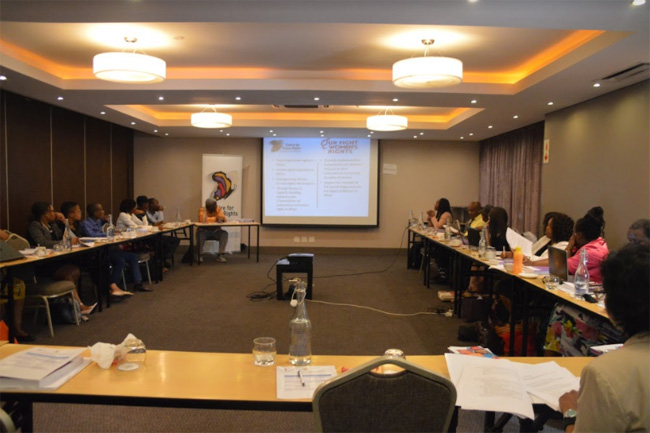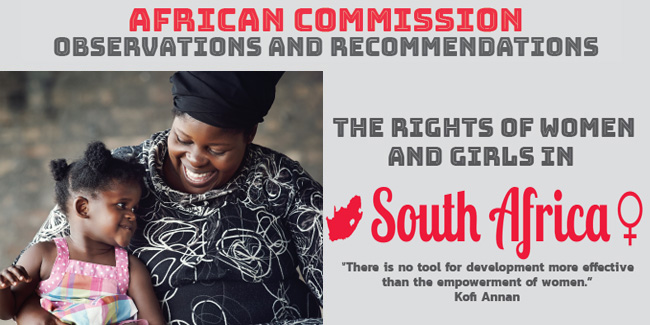By ratifying the Maputo Protocol in 2004, South Africa made a commitment to improve the status and protect the rights of women and girls in the country. It also committed under Article 62 of the African Charter and Article 26 (1) of the Maputo Protocol to submit periodic reports to the African Commission every two years from the time of ratification, highlighting the steps taken to guarantee the rights of women and girls. After consideration of these reports, concluding observations and recommendations are given to State Parties to guide them on the implementation of the rights as mentioned in the treaty.
A critical outcome of the meeting as shared by the Director, Centre for Human Rights, Prof. Frans Viljoen in his welcome remarks was the need to open the communication lines for both government and CSO’s to work together in a sustained and coordinated manner towards the effective implementation of the concluding observations. Other key objectives were to discuss progress made and apprise stakeholders on current practices and procedures relating to the implementation of the concluding observations by the South African government.
The concluding observations issued to South Africa includes the following:
- To domesticate the Maputo Protocol.
- To remove the reservations made under the Maputo Protocol in respect to the following articles:
- Article 4(2)(j) ensure that, in those countries where the death penalty still exists, not to carry out death sentences on pregnant or nursing women
- Article 6(d) every marriage shall be recorded in writing and registered in accordance with national laws, in order to be legally recognised
- Article 6(h) a woman and a man shall have equal rights, with respect to the nationality of their children except where this is contrary to a provision in national legislation or is contrary to national security interests
- To enforce laws that outlaw the practice of “Ukuthwala” and harmonise its laws on the minimum age of marriage to reflect 18 years as minimum without any exceptions.
- To speed up the enactment of the Hate Crimes Bill to criminalise corrective rape.
- To develop laws and policies to increase women’s representation in all levels of decision making and in the Judiciary.
- To develop programmes aimed at curbing pregnancy amongst girls of school going age
- To build operational and institutional mechanisms to combat the high rate of unemployment amongst women aged 15 to 24 years.
From the focus group discussion facilitated by Prof. Michelo Hansungule, Dr. Agaba Daphine Kabagambe and Ms. Linette du Toit, it was observed that South Africa has made significant progress on some of the concerns raised in the concluding observations while others still need to be addressed. On the issue of reservations, South Africa is currently in the process of lifting the reservations made at the ratification of the Maputo Protocol and these have been tabled before Parliament. However, to strengthen the ongoing process, stakeholder’s reiterated the need for public consultations before the removal of the reservations are finalized.
On the subject of “Ukuthwala” and child marriages, the Department of Women revealed that several provincial dialogues are currently underway to sensitize communities and to bring an end to these practices. Other programmes are also being carried out by the Departments of Basic Education and Health to address the problem of high teenage pregnancy and the resultant high school dropout rates. The participants also recognized strides made by South Africa to increase women’s participation in politics.
major concern highlighted was the lack of a visible coordination mechanism for responding to the concluding observations. This problem is further exacerbated by insufficient financial and human resources as well as heavy reporting obligations that result in weak implementation and monitoring of the concluding observations. CSO’s were also challenged to work hand in hand with the Government in this regard.
In conclusion, the focus group discussion highlighted the benefits of having an inter-ministerial task team that will be responsible for receiving, disseminating and taking forward the recommendations of the African Commission on the rights of women in South Africa. It was also very evident that there is need for a more proactive, coordinated and multi-sectoral stakeholder’s response to effectively address and implement the critical concerns mentioned in the concluding observations before the next reporting period.
For more information on South Africa’s Concluding Observations and Recommendations. Please view the factsheet below.



